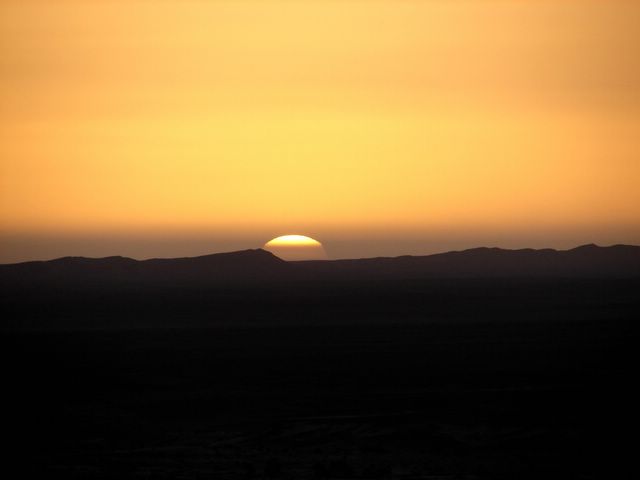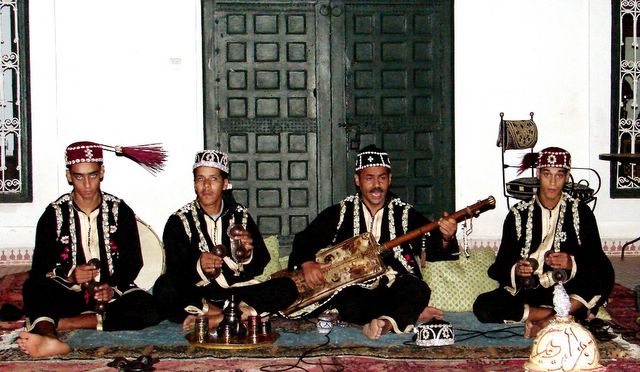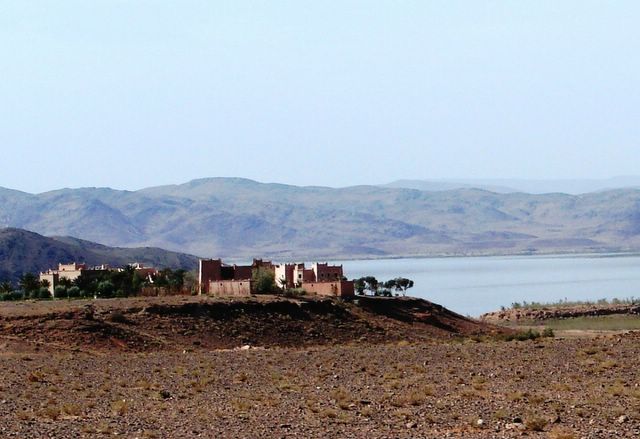...and Better Communication TooWhat we have consistently heard from high levels of the US government regarding the Middle East is that the biggest problem facing America in the region is overcoming a rampant disinformation and propaganda campaign led by unfriendly governments, non-state actors, and Arab media. We have heard several US officials and members of Congress insist on how “bad” and “irresponsible”
Al Jazeera is to the point of accusing it of being a “mouthpiece for Al-Qaeda”. The US conservative media machine became the firing pad for this message. Recently, they went so far as to call the satellite TV station a
“terrorist network”. The argument goes: “If only the people of the Middle East were able to hear our side of the story and understand our policy away from the incitement and hate speech practiced by the likes of Al Jazeera, everything will be just fine.”
In response, the US Congress authorized funding for a radio station,
Radio Sawa, and a satellite TV station,
Al Hurra, in order to carry an alternative message to the Middle East and act as a medium for ‘objective reporting’ on US policy. Several news websites such as
Magharebia were also started by the US Department of Defense, and the US state Department is sponsoring a lifestyle magazine for young men and women across the Middle East called
Hi Magazine. At the executive level, a new position of Undersecretary of State was created to carry out US public diplomacy efforts and formulate strategies for improving the image of the US abroad.
Three years after those specific media and public diplomacy initiatives were taken, it is time to evaluate the American strategy to reach out to the people of the Middle East and even revisit the overall assumption that America’s problems in the Middle East can be mainly settled with public diplomacy and media outreach.
On the media front, Radio Sawa did fairly well in terms of attracting an audience especially among young Arabs because it put forth a nice format alternating Arabic and Western music hits. Once, I caught a ride in a taxi in Casablanca and noticed that the driver was listening to Radio Sawa. However, as soon as the news report came on, he quickly switched to the local station.
I asked: Why?
He said: “They [the US] think we are stupid”.
I probed further by asking: But why listen to it at all if that’s how you feel?
He quickly replied: "I like the music they have on".
In October 2004, a
report by the State Department’s Office of the Inspector General found that, although Radio Sawa was able "to attract a large audience in key Middle East countries, the station has been so preoccupied with building an audience through its music that it has failed to adequately measure whether it is influencing minds." My exchange with the Taxi driver in Casablanca hints that the challenge Radio Sawa faces is one of legitimacy and credibility as long as it is viewed as an instrument of the US government. I think objectivity dictates that we at least consider the fact that the station is presented with a hard task in abnormal circumstances with the shroud of US government propaganda hanging over its head.
While Radio Sawa can at least be credited with attracting a large audience, we could not say the same for satellite TV station
Al Hurra. The station, for which Congress did not authorize funding until summer of 2003, is far behind the sophistication and programming of any Arab satellite TV station including
Al Jazeera,
Al Arabiya, and Abu Dhabi. Unlike my taxi experience in Casablanca, I have yet to meet anyone who watches any of Al Hurra’s programs. If and when Al Hurra overcomes technical and programming hurdles to at least be in the same league as the Gulf satellite TV stations, then it will also have to overcome the fact that it is seen in the Middle East as a US propaganda instrument.
On the other hand and in the area of news publishing,
Hi Magazine faces obstacles similar to those faced by Radio Sawa and Al Hurra (legitimacy, credibility, market penetration, etc.), but it also faces obstacles that are unique to published media. There is no additional cost (other than opportunity cost) for a resident of the Middle East to listen to or watch the US-sponsored stations if he/she so chooses. But with Hi Magazine, the Arab reader is asked to pay a per-unit price for a publication that he knows is sponsored by the US state Department. This is a huge socio-economic obstacle for the publication to gain market penetration even if it manages to overcome the other perception problems it faces. The magazine, however, has a website on which the contents of the Magazine are freely available. But that does not get rid of the economic disincentive entirely because TV and radio penetration far exceeds that of the internet in the Middle East (the region has been missing the train of globalization for years). This latter statement also points to problems faced by US news websites such as
Magharebia.
On the policy front, the newly-created position of Undersecretary of State in Charge of Public Diplomacy has already seen two unsuccessful and short-lived appointments. Last month, President Bush nominated his close adviser Karen Hughes to the post. He also nominated an Egyptian-American, Dina Powell, to the number two spot in that office. In response to that appointment,
I wrote that Karen Hughes must know that a propaganda campaign will not do the job. In regards to the Middle East, she should not make the mistake of following Arab regimes into the habit of insulting the intelligence of their people with blatant propaganda. What will cut it here is a concrete change in policy for which she will have to lobby relentlessly in the White House. I also believe that Mrs. Hughes should move to get the Arab Muslim community in the US to be more involved in U.S. public diplomacy efforts, because the American administration will not find better messengers to carry its goodwill to the Middle East than its own Arab and Muslim community.
The good news is that Karen Hughes enjoys direct access to the president, something her predecessors lacked. It is also a positive development that an Egyptian-American will be the number two official in charge of US public diplomacy. But, there is still a major lack of Muslim Staff in the administration’s main programs directed at the Middle East - and there in lies one of the problems of the current US strategy for public diplomacy. Administration officials admit that there is confusion about what public diplomacy means in the first place. Is it a communication job or is it an active policy-making job? I think both if you ask me, but the confusion looms and with it comes stalled progress and poor results. Furthermore, when you do not have the right people to help explain the problems you face, then you can not possibly come up with effective solutions – That is because you do not fully understand the problem. The US administration must stop to consider at least partly that the real problem it faces in the Middle East has to do with America’s own policy failures in the region and that America seems too distracted to realize that the fish it is trying to put back in the water is already dead.
How, you may ask. Well, let us consider a few realities:
1. US criticism has now become a blessing in the Middle East. The more US officials demonize an Arab media outlet, the more popular and credible the latter becomes among Arabs. Al-Jazeera, for instance, can effectively ignore US criticism as long as the Qatari government does not pull its funding. All it has to do is continue its programs and count its blessings. Actually, what they should probably do at this time is write the US administration a nice ‘Thank you’ note and encourage it to continue on its current track. By the way, calling on Arab governments to censor Al Jazeera all while defending the first amendment right of the conservative US media to desecrate the image of Muslims sends the message that America is only interested in the kind of freedom that serves its interests. It does not help either when US officials try to explain this contradiction by suggesting that Arabs are not sophisticated enough to make ‘intelligent use’ of freedom of the press.
I also think that it is incredibly flattering for a single media network to be credited with influencing the minds of 200 million Arabs. It is also unbelievably insulting for Arabs to be indirectly accused of not being sophisticated or intelligent enough so as to be enslaved by the ‘hypnotic force’ of a single TV station.
2. The images broadcast by Arab Satellite TV are not made up in a basement studio. They are real images of suffering brought on by war in Iraq and the Palestinian territories. The question becomes one of spin, context, and focus. The tilt and bias is introduced when there is a deliberate disregard for other information that is important for the objective and complete presentation of a news story. There is no doubt that Arab media is guilty of this conduct. The reason for this is actually simple to explain: Bad news sell - good news, not so much. You can show Arabs as many pictures of American goodwill in Iraq as you can, but they will still see Abu Ghraib. The American media is just as guilty of such bias. When was the last time you heard the words “Arab” or “Muslim” attached to anything positive on this side of the Atlantic. You can show Americans as many pictures of Muslim goodwill as you can, but they will still see 9/11.
3. American officials continue to equate talking to Arab leaders to having a “constructive” dialogue with the Arab World. Someone needs to remind them that there is a huge canyon between Arab ruling regimes and the Arab people. In addition, American policy regarding the Middle East is full of contradictions because American values have seldom been aligned with American interests in the region – contradictions the US has never corrected nor explained to the satisfaction of the people of the Middle East. US officials must simply understand that having “an understanding with Arab governments” is not enough. They need to forge an understanding with the people.
By the way, it is worth mentioning that it is not particularly heart-warming for Iraqis in particular and Arabs in general to hear President Bush say: “We are facing terrorists in Iraq so that we don’t face them here at home.” - Nice thing to say at a pep rally in America but someone needs to remind US officials that there is a thing now called satellite TV and internet media that beams those messages to the Middle East in mere seconds, reinforcing the perception that America considers the lives of Iraqis to be inferior to that of Americans.
Although I believe that an active public diplomacy effort must be undertaken by the US in order to promote understanding of US policy, I also believe that this can not just be about advocacy but also about inquiry and a great deal of listening . Although I believe that a big part of the problem in US-Middle East relations has to do with poor communication on both sides, I also believe that the crux of the problem remains one related to poor policy planning.
In other words, better communication and media outreach are very important although many more steps need to be taken in that regard as I described earlier. But as the former president would say: It's also the policy stupid.


 Congratulations to the women and men of Kuwait who marched into the Kuwaiti Parliament building last month demanding political rights for women in this tiny Gulf nation (see picture). Yesterday, the Kuwaiti National Assembly voted to grant its provisional approval for women to vote and contest municipal council elections. Twenty six MPs, including 12 ministers present in the session, voted for the law while 20 voted against and three MPs abstained. Eight MPs did not take part in the voting because they did not attend the session. The vote was divided along partisan lines in that liberal lawmakers voted for the law while almost all tribal and Islamist MPs opposed it.
Congratulations to the women and men of Kuwait who marched into the Kuwaiti Parliament building last month demanding political rights for women in this tiny Gulf nation (see picture). Yesterday, the Kuwaiti National Assembly voted to grant its provisional approval for women to vote and contest municipal council elections. Twenty six MPs, including 12 ministers present in the session, voted for the law while 20 voted against and three MPs abstained. Eight MPs did not take part in the voting because they did not attend the session. The vote was divided along partisan lines in that liberal lawmakers voted for the law while almost all tribal and Islamist MPs opposed it..jpg) After a six-month delay, the Arab division of the UN Development Program (
After a six-month delay, the Arab division of the UN Development Program (























